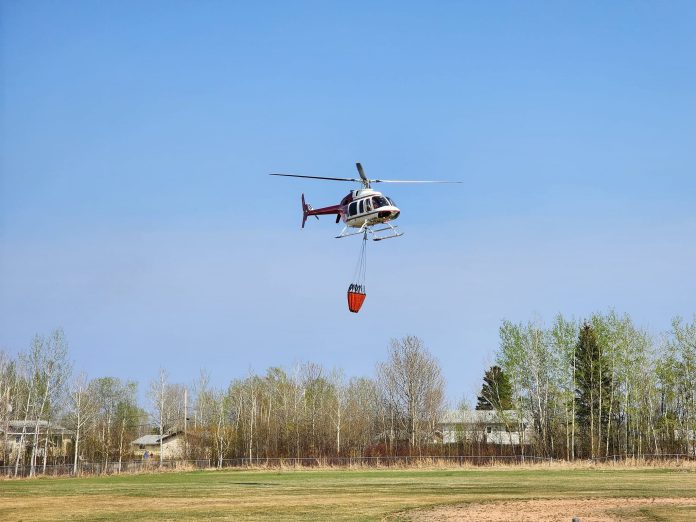
As of 10 a.m. on Tuesday morning, there were 23 active wildfires burning across the province, said the Saskatchewan Public Safety Agency (SPSA) while providing an update on Saskatchewan’s wildfire situation.
Twelve wildfires are undergoing assessment, three fires are contained, three are classified as protecting property, and five are not contained.
According to SPSA President and Fire Commissioner Marlo Pritchard, Saskatchewan has seen 183 wildfires to date, which is 77 more than the five-year average.
“Generally, these fires are extremely aggressive because of the spring conditions and because of the large volume of smoke they have been generating, that has greatly curtailed some of our activity,” said Vice President of Operations, Steve Roberts. “Both to get into these fires and get crews on the ground, but also to assess where we might have risks and threats by these fires.”
Due to the shortage of spring rain and lack of green up, the SPSA is seeing more area burnt than in previous wildfire seasons.
“We often have a number of fires, but rarely do they get as large as this,” said Roberts.
Pritchard noted that various things must be evaluated before the SPSA can begin taking action on a wildfire.
This includes the size, intensity, and location of the fire, the threat it may pose, the SPSA’s ability to successfully protect people, property and communities, the resources required to contain the fire, the cost to manage the fire compared to risk, how safe it is to respond, and how or if the response minimizes economic impact.
“The magnitude of a response does not necessarily equate to a wildfire’s distance from a community,” added Pritchard.
Pritchard emphasized that the SPSA has no “let it burn” policy.
“The SPSA assesses every wildfire and makes a decision about the best way to manage each one,” said Pritchard.
Human life is the first and foremost priority for the SPSA, as well as communities, major public infrastructure, commercial, forest, and other values.
“Healthy, vibrant forests are naturally renewed by fire, so it makes ecological sense to allow some non-threatening fires to occur unhindered,” he noted.
The SPSA has provided air scrubbers to communities affected by wildfires, allowing them to safely shelter in place as special air quality statements remain in effect for areas of north-central Saskatchewan.
“Smoke is playing a significant role at this time of year on our suppression efforts,” said Roberts.
The agency recommended avoiding the area of the Smith fire, located north of Churchill River, due to the smoke conditions.
As of 1 p.m. on May 23, Canada Post reinstated normal delivery and postal services in the communities of Beauval, Buffalo Narrows, Clearwater, Ile-a-la-Crosse, Island Lake, and Turnor Lake.
Red delivery service alerts continue in the communities of Patuanak and Dillon.
Travel advisories remain in place for Montreal River and around the area of Besnard Lake, said the SPSA.
Wildfires have caused the closure of two highways in the province. Signage and barricades staffed by the Ministry of Highways are set up on Highway 910 from the junction of Highway 165 to Besnard Lake and Highway 911 from Highway 106 to Deschambault Lake.
The MacKay Lake and Wadin Bay campgrounds are also currently closed due to the Sharp fire.
Some precipitation is expected for the central part of the province in the coming days, but Roberts said the rain will miss most of Saskatchewan’s northern forest area.
“Overall though, temperatures will drop,” said Roberts. “Where we receive precipitation and lower temperatures and higher humidities, we will be able to make much more significant headway on some of these fires.”
Once the SPSA is able to secure the fires and slow their growth, smoke conditions will begin to lift and benefit evacuees.
The SPSA is reminding residents to take extreme caution when on or near dry grass, operating ATVs, using tools, and disposing of smoking materials.
“We want to urge everyone across the province to be diligent in preventing fires and protecting their communities by taking those little actions that matter,” said Pritchard.
Residents with questions or those who have been evacuated can reach out to the SPSA’s toll-free information line at 1-855-559-5502. Information can also be found online at the SPSA website at saskpublicsafety.ca.

